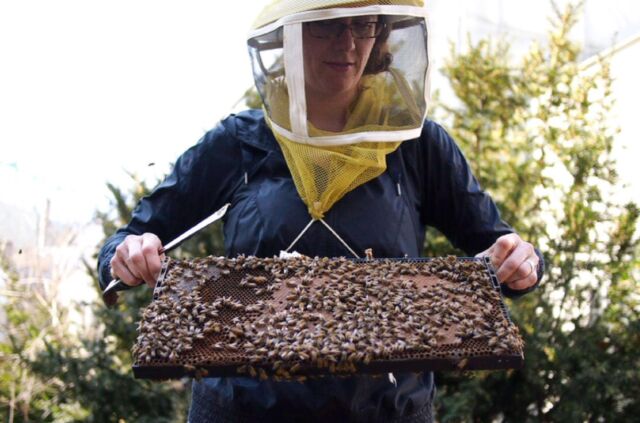Though the company offered raises and concession on health care and retirement, the union is standing firm.
By Dave LeshtzTwitter
TODAY

Members of the United Auto Workers strike outside of a John Deere plant in Ankeny, Iowa.
DAVENPORT, IOWA—In October the United Auto Workers and Iowa’s labor movement were on the march.
Community support and sympathetic media were solidly behind the 10,100 striking John Deere and Company employees. Workers at America’s biggest maker of agricultural machinery were justifiably insulted by Deere’s initial contract offer of a 5 percent raise following a year of record-breaking profits. They had been deemed essential workers, but apparently none were as essential as Deere’s CEO John May, who made $15.6 million in 2020—a 160 percent raise.
Dozens of businesses contributed discounted meals, drinks, haircuts, chiropractic services, fishing gear, and even a free session at Davenport Axe Throwing. The Retail Wholesale and Department Store Union in North Liberty donated 8,000 pounds of food. RWDSU Local 110 Vice President Bob Dixon said, “It’s about corporate greed…. people need to come together as members and as employees to fight against that.”Top ArticlesREAD MOREIt’s in the Air

Iowa Senate Democratic Leader Zach Wahls and other Democratic legislators delivered strong statements of support, as did Iowa’s Federation of Labor, the Teamsters, the Iowa Farmers Union, and Senator Bernie Sanders. Secretary of Agriculture—and former Iowa governor—Tom Vilsack visited a picket line in Ankeny. “You deserve a fair price and a fair deal,” Vilsack told the workers. He thanked them for supporting his gubernatorial campaign in 1998: “The UAW was with me from the get-go. You don’t forget the people that were with you.”
Election Day in Iowa was also the day UAW members voted on a renegotiated contract, after overwhelmingly rejecting a tentative agreement on October 10. The second agreement between Deere and UAW leaders would give workers an immediate 10 percent raise with two additional raises of 5 percent over the course of a six-year contract. Workers would receive a bonus of $8,500 upon ratification of the contract. Deere also made some concessions on health care and retirement, but the two-tier salary system remained, with so-called “supplemental employees” paid substantially less than their coworkers doing the same jobs.
Many union members, anxious about their paychecks as the holidays approach, believe it is time to declare victory and get back to work. The majority disagree and voted down the second agreement by roughly 55 percent to 45 percent. Some say the rejection reflects a continuing dissatisfaction with their own leaders. Others blame uncertainty about the company’s Continuous Improvement Pay Plan, which is based on a complex incentive system. Many point to an overall sense that Deere management doesn’t respect them, despite their loyalty and hard work during the Covid pandemic.
Resentments hardened when Deere obtained an injunction to limit the number of picketers to four at any one time. The injunction went so far as to ban burn barrels for keeping warm at night. Tension spiked further when UAW member Richard Rich, a 56-year-old Deere warehouse inspector for 15 years, was struck and tragically killed by a car while crossing a poorly lit road near a picket line.
Public support doesn’t appear to have diminished, and Iowa unions continue to stand with the UAW. The Hawkeye Area Labor Council in Cedar Rapids, IBEW 405, and the Iowa City Federation of Labor are among those collecting and delivering household and hygiene items to strikers.
Deere management insists that the contract on the table is its “last, best, and final offer.” A Deere executive also issued a veiled threat, according to the Des Moines Register, to make up for the slack in domestic production by shifting some of the work to overseas factories. No word yet from Iowa Governor Kim Reynolds or Senators Charles Grassley and Joni Ernst—all Republicans—on how they feel about the prospect of jobs in their state being outsourced to workers in other countries.
RELATED ARTICLES
THE WORKING CLASS IS ON STRIKE
John Fetterman
THE HISTORY OF THE UNITED STATES AS THE HISTORY OF CAPITALISM
Steven Hahn
THE BUFFALO HOSPITAL STRIKE IS THE LATEST IN A NEW WAVE OF LABOR UNREST
C.M. Lewis
Will Iowa’s labor movement keep moving? The two sides are said to be talking, but the outcome is hard to predict. Most of today’s strikers are young, with little knowledge of Iowa’s militant labor history to inspire them. They aren’t aware that the UAW was preceded by the Farm Equipment Workers who organized John Deere over 70 years ago. (See The Long Deep Grudge: A Story of Big Capital, Radical Labor, and Class War in the American Heartland, by Toni Gilpin).
Several UAW members I’ve recently talked with were not aware that Iowa’s Republican-led legislature nearly abolished public-sector unions in 2017 by stripping the guts out of Chapter 20, an Iowa collective bargaining law that operated efficiently and fairly—with no strikes—since the 1970s. Despite the heroic efforts of the University of Iowa’s Labor Center to educate workers, we still have many miles to go.
The good news is that the Republican assault on collective bargaining in Iowa hasn’t worked. Unions must hold a recertification vote every time a contract is renegotiated, and more than 50 percent must vote Yes, with nonvotes counted as No votes. Against all odds, almost every union in the state has voted Yes to recertify.
It’s a rocky road, but the labor movement is marching on in Iowa.
Our reporters
Yesterday, reporters for the World Socialist Web Site travelled to the John Deere tractor parts factory in Orléans, south of Paris, which employs some 800 workers. They discussed the ongoing month-long strike by more than 10,000 John Deere workers in the United States, who are opposing the efforts of the company and United Auto Workers union to impose a concessions-laden contract.
The Orléans Deere workers expressed their support and solidarity for their striking co-workers internationally and denounced the efforts of the company to pit workers against one another across national boundaries.
“They should continue to fight for their rights,” said Weigel, who has three years’ experience at Orléans. “Whether it is in the United States or in France, it is always the big companies that profit off of the workers, and then whine about having to raise wages by 1-2 percent.
“We should unite together against the multinational in order to not be their prey. The workers in different countries have to be able to help each other.”
Matthieu, who has eight years’ experience at the Orléans plant, said, “We’re in solidarity with the American workers, especially since we hear that they don’t get to go on strike very often. They negotiate for a period of several years. And we heard that the boss just got a 160 percent pay increase.”
“We have to have international solidarity,” he explained. “Here there are certain production lines that, every time we go on strike, the company threatens us that these jobs may be taken away elsewhere. It’s a constant blackmail against our jobs. They threaten us.”
He described the conditions for the workers in France. “Prices for everything are rising,” he said. “They’re announcing another year of exceptional profits for John Deere. Each time there is an annual bargaining meeting in April they announce profits, and they’re always considerable. Then they announce a 1 percent pay increase. There is high inflation but they tell us it is only 1.2 percent. Then they don’t understand why we would want to strike.
“They announce profits, the shareholders take everything, and they give us crumbs.”
In April this year, the Orléans plant was shut down for three days by Deere workers who were demanding increased bonuses and pay increases. “We wanted the bonus to not be a percentage of wages [which would give higher bonuses to management] but that the same sum would be paid to everyone.”
“The trade unions did not pay strike pay during the strike and when we struck for three days they asked the management only that the deduction from our salary be spread over three months,” he noted. Nor, in the case of the strike in the US, did the union seek to keep workers up to date about the struggle. “The trade unions did not come to see us saying there is a strike in the US,” he said. “We found out about it because it was in the news.”
“There is a growing anger,” Matthieu said. “The previous time there was a strike, there were only about 30 people who participated. This time there were over 200.”
Mélanie is a temporary worker at John Deere. A large portion of the Orléans plant workforce is made up of such temporary workers. They are hired via subcontractor agencies on short 18-month contracts, which they are unable to renew.
“What you describe about the trade unions in the United States, I have the impression that it is the same everywhere,” she said, referring to the corruption scandal that exposed millions of dollars in kickbacks to the UAW leaders by the giant automakers. “Here the unions organise little strikes, toward the employer they adopt a strong enough tone, but really there is nothing much more than that. They are even supposed to give a debrief meeting with us every month but they don’t do it. They could take all our questions to try to address problems, but it doesn’t happen.”
“Concretely I would say to the US workers to not give up. Everything comes to those who demand it. They shouldn’t give up because they are 10,000 fighting it.”
Benjamin, a temporary worker with three months at the plant, told our reporters: “We are following this closely. There is support for the strike here that is sure. If they can make things change, they need to improve their working conditions.”
John Deere strike at the crossroads
Jerry White
WSWS.ORG
The nearly month-long strike by 10,100 John Deere workers in Iowa, Illinois and other states is at a critical turning point. In the week since workers voted down a second company proposal backed by the United Auto Workers union, Deere has gone on the offensive.
There are two alternative roads confronting workers. On the one hand, Deere and the UAW are dead set on getting a contract through that throttles workers’ incomes and allows the company to continue to reap record profits. They will continue to conspire and use every weapon and dirty trick at their disposal to divide workers and crush their resistance.
But the path to the strike’s victory exists and is this: Workers taking the initiative into their own hands, establishing rank-and-file organizations at every plant and warehouse, and appealing directly to autoworkers and Deere workers in the US and internationally to mobilize in support of their struggle, which has the potential to impact the fate of all workers.
The company has launched a media blitz, with top executives fanning out to tout their supposedly generous offer and suggesting its defeat by a 55-45 percent margin was largely due to a minority of unreasonable workers. With the UAW failing twice to push through its demands, Deere has sent text messages directly to workers in a naked effort to divide them and force a re-vote on the deal, which management insists is its “last, best and final” offer.
The walkout has caused serious delays in the shipment of replacement parts farmers need to keep their Deere equipment running during the last few weeks of the harvest season. After the contract was defeated, management announced it was stepping up its strikebreaking “customer service continuity plan,” which includes deploying supervisors, engineers and other salaried workers to its facilities and ramping up production at factories outside the US.
While Deere officials publicly declare they still want an agreement to bring back the current workers, they have not ruled out hiring scabs to replace the strikers. “If we walk through this and the information that’s in front of folks, the deal that’s in front of them, doesn’t work for them, we have to figure out how we continue to serve our customers going forward,” Cory Reed, president of Deere’s Worldwide Agriculture & Turf Division, said in a Des Moines Register article published Monday. “That planning is always ongoing.”
Far from mobilizing the union’s 400,000 members to oppose these strikebreaking threats, the UAW is forcing the Deere workers to fight the multinational giant alone. After its second deal with the company was voted down, the UAW International issued a perfunctory three-sentence announcement, declaring it would resume meetings with Deere management—not the workers—to “discuss next steps.”
The UAW has imposed a complete information blackout on Deere workers and has not even acknowledged any of its closed-door discussions with the Deere bosses. Meanwhile, it is continuing to keep Deere workers on starvation rations of $275 a week in strike benefits despite a strike fund—paid for with workers’ dues—valued at nearly $800 million.
There is no doubt that UAW officials are plotting with corporate management to wear down the resistance of workers and force a re-vote on the same deal, or a slightly modified one that still fails to meet workers’ demands.
With Deere expected to rake in nearly $6 billion in profits this year—at least 62 percent more than its previous record in 2013—striking workers are determined to secure a $10 an hour raise to offset more than 25 years of UAW-backed wage concessions and protect their families from the rising cost of fuel, food and other basic necessities. They also want to restore fully paid retiree health care benefits for every generation of workers, which the UAW gave up in 1997.
The UAW is determined not to win the strike, but to defeat it. UAW President Ray Curry, Vice President Chuck Browning and the rest of the affluent business executives at the UAW’s “Solidarity House” headquarters know a victory for the Deere workers would spark a far wider rank-and-file rebellion against the UAW. Workers at Caterpillar, Volvo and Mack Trucks, at GM, Ford and Stellantis, at auto parts suppliers Dana, Faurecia and Lear, and countless other locations all work under contracts with divisive tiered wage and benefit systems and other oppressive conditions, imposed by the same bribe-taking UAW officials through lies, threats of job losses and outright vote rigging.
The battle at Deere is part of what is developing into the largest strike wave in the US and internationally in generations. Since the beginning of the year, there have been more than 150 strikes in the US, involving workers from virtually every sector of the economy. Thousands—including Deere workers; Kellogg’s workers; nurses and other health care workers in California, West Virginia and Massachusetts; Alabama coal miners; Scranton, Pennsylvania teachers and Columbia University grad students—are currently on strike. Another 30,000 Kaiser Permanente health care workers in California and Oregon are set to strike on November 15, and 60,000 film and production workers, who were ready to strike last month, are voting on a deeply despised sellout contract this weekend.
These are part of a growing wave of international struggles—including strikes by teachers, nurses and other public sector workers in Canada, Portugal, Sri Lanka, Mexico and other countries, as workers seek to combat the austerity measures capitalist governments are imposing to pay for massive corporate and bank bailouts.
The conditions are emerging for these struggles to be unified into a powerful industrial and political counteroffensive by the working class against decades of eroding living standards and the explosion of social inequality.
These militant struggles are being fueled by the response of capitalist governments all over the world to the pandemic, which has prioritized profit over lives. Since the beginning of the pandemic, the wealth of billionaires in the US alone has risen by 70 percent—from nearly $3 trillion to over $5 trillion—even as 89 million workers lost their jobs, 47 million people were infected with COVID-19 with unknown long-term consequences, and more than 776,000 died.
After being forced to risk their lives, workers all over the world are refusing to accept wages that fail to keep up with inflation, exhausting schedules that rob them of their family life and health, and the lies of company executives and union bureaucrats who say there is no money to meet their just demands.
In every struggle which is taking place or emerging, the biggest obstacles to workers’ unification are the corporatist unions, which function as a labor police force and partners in the exploitation of the working class. That is why increasing numbers of workers, including educators, health care workers, Amazon workers, and auto and auto parts workers at Volvo Trucks, Dana, Deere and the Detroit automakers, are joining the growing network of rank-and-file factory and workplace committees, which reject the authority of the pro-company unions and fight for the independent interests of the working class.
On Saturday, workers at an online meeting sponsored by the World Socialist Web Site voted to establish the Deere Strike Rank-and-File Solidarity Committee to mobilize the broadest support for the striking workers.
To fight transnational corporations like Deere, workers need a global strategy. The striving of workers for international solidarity has been expressed by the Deere workers in Mannheim, Germany, who have repeatedly voiced their support for their brothers and sisters in the US. In May, the International Workers Alliance of Rank-and-File Committees (IWA-RFC) was founded to coordinate the growing struggles of the working class across all national borders.
The fight against capitalist exploitation is inseparable from a fight to eliminate the pandemic and end the sacrifice of human life for corporate profit. The growing wave of strikes and struggles across the world must be developed into a conscious political struggle to establish workers’ power and reorganize economic life based on socialist planning and production for human need, not private profit.













:format(jpeg)/cloudfront-us-east-1.images.arcpublishing.com/tgam/PAK3CFQ3EZKQLHAAZD55NUHAC4.jpg)





